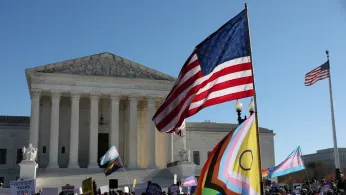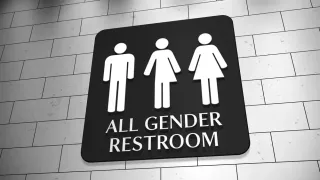
4 hours ago
South Carolina Urges Supreme Court to Reinstate Ban on Transgender Student Bathroom Access
READ TIME: 3 MIN.
South Carolina officials have filed an emergency petition with the U.S. Supreme Court, asking the justices to temporarily restore a state law that bars transgender students from using public school bathrooms consistent with their gender identity. The petition comes after a federal appeals court blocked enforcement of the provision, which was included in the state’s latest education funding bill and conditions school district funding on compliance with the restrictive bathroom policy.
The case centers on John Doe, a transgender boy enrolled in a Berkeley County public school, who—along with his guardians—filed suit last November. Doe’s legal team argues that the state’s bathroom provision violates both the Equal Protection Clause of the U.S. Constitution and Title IX of the Civil Rights Act of 1964, which prohibits sex-based discrimination in federally funded educational programs. According to court filings, Doe was classified as “female” under the law’s definitions, thus prevented from using boys’ restrooms at school—a restriction his attorneys argue constitutes unlawful discrimination.
The challenged provision, first passed as a temporary provision in a 2024 budget bill, with 25% of state school funding contingent on compliance, was reintroduced for the 2025 fiscal year and took effect July 1 . Following the federal appeals court’s injunction, South Carolina has been barred from enforcing the ban against Doe while his lawsuit proceeds.
South Carolina’s emergency petition contends that the bathroom law does not discriminate based on gender identity, instead arguing that it creates a uniform standard based on “biological sex at birth” for all students. State officials emphasize that the provision reflects “the will of the people of South Carolina” after near-unanimous legislative approval and is aimed at “protecting the privacy of public school students”. In their filing, they assert that the Supreme Court should defer to state lawmakers on this policy matter and claim the request merely seeks to restore the status quo while litigation is ongoing.
The petition also references the Supreme Court’s decision in United States v. Skrmetti, where the Court upheld Tennessee’s ban on certain medical treatments for transgender minors, as a precedent that could influence the outcome of the current dispute . Whether the Court will agree that the Skrmetti ruling applies to the bathroom context remains a central question.
The petition has sparked significant concern among queer advocates, who argue that such policies single out and stigmatize transgender students, undermining their safety and well-being in educational settings. Legal advocacy organizations and civil rights groups have issued statements condemning the state’s move, emphasizing the mental health impacts and educational barriers that exclusionary bathroom policies create for transgender youth.
Advocates point out that federal civil rights protections and previous court decisions—including the Supreme Court’s 2020 Bostock v. Clayton County ruling, which recognized protections for queer people under Title VII—should be interpreted to extend to educational environments and facilities access . They warn that the outcome of South Carolina’s emergency petition may have far-reaching implications for transgender students’ rights not only in the state but nationwide, especially as similar policies have been proposed or enacted in other states.
The Supreme Court’s decision on South Carolina’s request is expected to serve as an early test of the broader impact of the recent Skrmetti ruling and could signal how the justices will approach future cases involving transgender rights and access to public facilities .
As the legal challenge proceeds, school districts, students, and families across South Carolina remain in a state of uncertainty. Many educators and administrators have expressed concern about the conflicting directives from state and federal authorities, as well as the logistical and ethical challenges of enforcing restrictive bathroom policies .
The case arrives amid a wave of legislative efforts targeting transgender rights in education, health care, and sports at both state and national levels. Civil rights experts note that the Supreme Court’s eventual ruling may shape the legal landscape for LGBTQ+ students far beyond South Carolina, potentially influencing school policies, state laws, and federal guidance for years to come .






